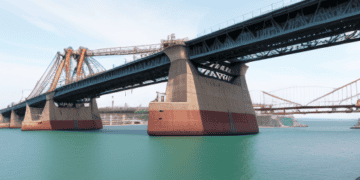The Port of Baltimore faces an indefinite shutdown following a collision involving the Singapore-flagged container ship, Dali, which resulted in the collapse of the Francis Scott Key Bridge. This incident has led to significant disruptions in trade, with around a dozen cargo ships trapped inside the port and approximately 70 vessels, including small cargo ships, tugboats, and pleasure craft, affected overall. Some 40 ships en route to Baltimore have been forced to reroute.
US Secretary of Transportation Pete Buttigieg highlighted the incident’s impact on the livelihoods of thousands of port workers, emphasizing the potential loss of approximately $2 million in wages daily. Last year, the Port of Baltimore managed 52.3 million tons of foreign cargo valued at about $80.8 billion, marking it as a critical node for coal exports among other commodities.
The bridge’s collapse not only disrupts local economic activities but also has broader implications for the national and global supply chain, particularly in the automotive and agricultural equipment sectors. Efforts are underway to mitigate the impact, with the Department of Transportation establishing a freight office to coordinate responses to such incidents. Secretary Buttigieg announced plans to convene shippers and supply chain partners to promote a coordinated adaptation to these temporary disruptions.
Experts assess the long-term implications of the bridge collapse on global trade and insurance premiums. While the impact on global trade might be minimal compared to incidents like the Suez Canal blockage, the importance of safety measures and protective actions against similar future occurrences has been underscored. Enhanced ship anti-collision measures and bridge structure reinforcements are being considered to prevent further incidents.
The financial repercussions of the damage, potentially covered by a Protection & Indemnity (P&I) club through pooled insurance premiums, could influence future insurance costs and, indirectly, consumer prices. The insurance industry, accustomed to managing significant losses, anticipates potential increases in freight costs resulting from higher insurance premiums.
As investigations continue and authorities work towards reopening the port, the focus remains on ensuring the safety of maritime operations and minimizing the economic fallout from this significant disruption.
Breaking supply chain news is just a click away at The Supply Chain Report. Enhance your knowledge of international trade at ADAMftd.com with free tools.
#BaltimorePortNews #BridgeCollapse #TradeDisruptionNews #EconomicImpactNews #CargoShip















